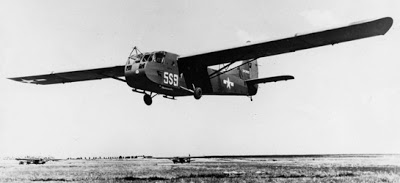 WACO CG-4A combat glider.
WACO CG-4A combat glider.Various obituaries of Walter Cronkite claim that he "parachuted" into Holland with the 101st Airborne Division during Operation Market Garden. For example, this is what ABC reported:
During World War II, Cronkite traveled to Europe to cover fighting from the front lines. As a war correspondent, Cronkite earned a reputation as a courageous and tireless reporter, parachuting into Holland with the 101st Airborne Division and talking to soldiers at the Battle of the Bulge. -- "Walter Cronkite, Legendary Newsman Dies at Age 92," by Huma Khan and Caitlin Taylor, 17 July 2009.
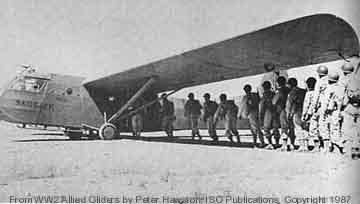 Glider infantry loading onto a CG-A.
Glider infantry loading onto a CG-A.In fact, Cronkite landed in Holland with the glider riders of the 101st in a WACO CG-4A combat glider.
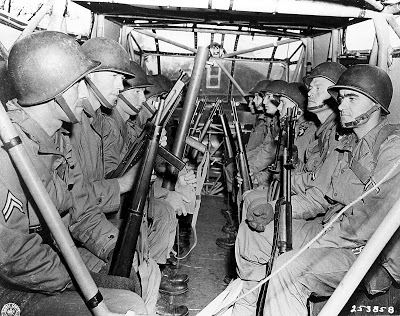 Packed in like sardines.
Packed in like sardines.The experience made a considerable impression on the young reporter.
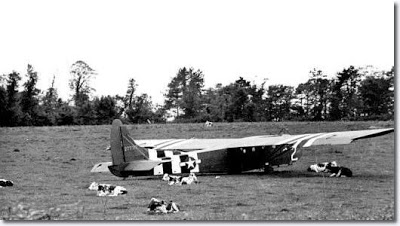 A statistically rare safe landing.
A statistically rare safe landing.In the foreword to John Lowden’s Silent Wings at War, Cronkite recalled his one and only glider flight:
I'll tell you straight out: If you've got to go into combat, don't go by glider. Walk, crawl, parachute, swim, float -- anything. But don't go by glider! This comes from someone who did it -- once. . .
When I arrived at 101st headquarters the night before the mission, I was told that I was to go in by glider and not by parachute as I was led to believe. I came close to disgracing myself by turning down the mission . . . I didn't want to go by glider. I had seen what had happened to the gliders in Normandy. The wreckage of hundreds of them was scattered across the countryside. Many were impaled on the spiked posts the Germans had planted to defeat them. But I decided that the only thing worse than going to Holland in a glider would be the ignominy of not going at all on a mission for which I had volunteered . . .
So I loaded up with members of a headquarters company into a glider just before dawn the next morning. I took my seat on the wooden bench that ran down the side of the glider. My two musette bags with my typewriter and paper in one and toilet articles in the other were in my lap, and my heart was in my mouth.
The takeoff was not so bad. The C-47 towing us attained just the right speed down the runway to take up the tension on our tow line with unexpected smoothness, and I began to relax. Well, actually, I didn't relax. What I did was take a deep breath for the first time that morning. And I began to find a few flecks of silver in my clouds.
"Well," I thought, "at least this ride will be quiet compared to those raids in the bombers with the deafening roar of their engines."
Wrong!
Riding in those Waco gliders was like attending a rock concert while locked in the bass drum. The glider was just a tubular steel frame over which canvas was stretched for the fuselage. Once in the windstream, the canvas beat against the frame with enough decibels to promise permanent deafness. Conversation was impossible, but a sergeant sitting across from me kept hitting me on the knee and mouthing some words that were totally incomprehensible. He might have been trying to comfort me, but, having learned something of the macho nature of the airborne soldiers, I suspect he was telling me something intended to scare me out of my wits.
The sight from aloft was incredible -- other C-47s and their gliders filled the sky, it seemed from horizon to horizon. . . As we approached our landing zone we became aware that we were encountering ground fire. It wasn't heavy flak as I had seen from the bombers, but there was tragic evidence that it was there. A C-47 not far off to our left apparently was hit. One of its two engines burst into flames, the glider cut loose, and the C-47 turned slowly on its side and fell to earth.
Entranced with that horror I suddenly became aware that my glider mates were bracing and our pilot was tense. And then he pushed the lever that released us from our tow. We dropped like a stone -- plunged straight down, it seemed to me. "I knew it, I knew it, I knew it," I was saying to myself. "I knew these things couldn't fly on their own."
We dived like that for an interminable time -- probably counted in seconds. The ground was fast approaching. I don't recall my life flashing before me. I only remember thinking that I knew better than to be there. I don't think we were more than a hundred feet from the ground when our pilot pulled back on the elevator controls. It seemed that we were pulling enough "g's", enough force of gravity, to push us all right out of the bottom of the glider. The pilot leveled off and made a 180-degree into the wind, and I was aware then that other gliders were landing just ahead of us and that there were still others to our sides also going into the same large field.
We touched down and bumped across a roughly plowed field and I was breathing again when suddenly our pilot yelled, "Here we go!" The nose of our glider plowed into the soft black dirt, the tail flew up into the air, the dirt came piling into the crushed nose, and all was still.
"Okay, let's get the hell out of here," came a voice, and I dug around in the dirt and found my musette bags that had flown off my lap, although I thought I was holding them tightly as instructed. I had to grab a helemt from among several in the dirt. One of the phenomena of glider landings in such controlled crashes is that helmets have a way of flying off even though they have been tightly secured around one's chin, sort of like how shoes somehow come off auto accident victims. I had been warned in advance that this was a serious hazard. A heavy metal helmet with its rather sharp edge could make a pretty impressive missle.
Our pilot was miraculously unhurt and it was only later, when I inquired as to why so many of the gliders crash-landed even as we had, that I learned the kind of guts these guys really had. They told me that the pilots sometimes had to deliberately crash those things when they ran out of landing room. They sat there in the very front of the glider with only a thin piece of plastic windshield between them and the earth, with no protective barriers or padded clothing, and, rolling along at 60 or 70 miles and hour or more, deliberately nosed the glider into the ground. A quick stop, to permit the troops to get out and disperse as quickly as possible, was preferable to rolling slowly to a standstill while making a constantly more attractive target for enemy fire. And I learned too that the deliberate dive when our tow rope was released was to get out from under enemy fire as quickly as possible. The skill that it took to gauge airspeed to successfully perform that maneuver was considerable; the courage it took to nose that glider into the dirt was extraordinary, about equivalent to doing a swan dive onto the sidewalk.
We were the lucky ones. As we half-crawled across the landing zone to the drainage ditch that was our rendezvous point, other gliders were landing around us -- the other lucky ones. But others came tumbling out of the sky. Two collided almost above us and a jeep and a howitzer, and soldiers, came crashing down. A C-47 came in low overhead, streaming smoke and exploded in the woods just beyond. Another glider came straight down and plowed into the soft earth like an artillery shell. The field was scattered with gliders on their noses, on their sides, on their backs. It was a scene from hell, but the 101st seemed pleased that it was a successful glider operation.
Oh, about that helmet: I had grabbed one from the mess in our glider, and as we worked our way toward the ditch, I felt a tug at my pants leg. Turning around, I realized I was being followed by several soldiers. The tugger shouted above the din, "Lieutenant, are you sure we are going in the right direction?"
"Hell, I'm a war correspondent. I'm not a lieutenant."
"Well, then take off that damn helmet," he shouted.
I had picked up a helmet with a white stripe down the back denoting an officer. It was a mistake, but it gave me one moment of glory leading some of America's finest "Screaming Eagles" into combat.
But if I had had my druthers, I wouldn't have gotten there by glider.
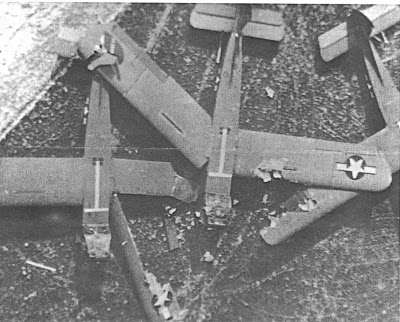 Often, as in this image from Normandy, glider LZs got a little crowded.
Often, as in this image from Normandy, glider LZs got a little crowded.Cronkite later said that the experience provided "a life-long cure for constipation."
12 comments:
Cronkite was simply an earlier incarnation of Chris Matthews and Dan Rather. He single-handled rebranded the US decisive victory in Tet '68 as a total defeat and sowed the seeds for the accleration of the anti-war movement in the US. I'll shed not a single tear for the leftist sympathizer.
The article brings back memories. My father was one of the first U.S. glider pilots. He had a pilot's license before the war, but was too old to enter most flight training, and didn't have a multiengine rating to become a transport pilot. He had three bronze arrowheads for being behind enemy lines-- Sicily, Normandy (D+1) and Holland. He told lots of funny stories of things he experienced during his years in uniform. He talked very little about his days in combat, and then almost always about the courage and skills of others.
One somewhat funny story of combat-- I guess it's funny. I don't think it would be funny if it happened to me. Daddy went into Holland (Nijmegen) armed with a Thompson. He had ammo and spare mags in his mussette bag stuck next to his pilot's seat. The Thompson hung by it's strap over the back of his seat. When he got the thing stopped, the troops bailed out. Daddy grabbed his mussette back and reached for the subgun. THere, handing from his seat was an M1 carbine. One of the troops in the back just couldn't resist getting his hands on a Thompson, so Daddy went into combat with an unloaded carbine and one of the glider infantry men went in with an unloaded Tommy gun.
Daddy used to say that the only reason that we won is that the German's were slightely more "fouled" up than we were. Daddy didn't cuss. When a word that has to be substituted crossed his lips, people listened because they knew he was intentional in it's use.
Daddy died in 1991.
Excuse me, but I wanted to find a post on this blog dealing with the execution of a Colonel and his family after the Fall of Saigon. I believe this was in Cambodia.
Anyone know the link or can supply the month/title for it?
The overall topic was not about Cambodia in so much as it was about working for the Left and realizing what it truly was.
Ymarsakar:
The post you're looking for is here
/sipseystreetirregulars.blogspot.com/2009/05/missed-anniversary-vous-les-americains.html
So he didn't jump, that would be kinda hard for an untrained person to do, I don't care how many movies show diferently. Hell glider riders DID NOT EVEN DRAW HAZARADOUS DUTY PAY. WERE NOT EVEN CONSIDERED PARATROPERS BY THE REST OF THE AIRBORNE. Their job was very diffucult and as an old jumper myself form the 60's I would not have wanted to take that ride myself. Nevertheless I won't morn Cronkite either for helping politician wimp out and leaving my brothers to rot in prison camps.
The man "most trusted" by the establishment to mislead the American people and propagate their lies and half-truths!
He started leaning left after Korea, and got progressively worse during Vietnam... He "was" a real newsman though, and had been in the field more than once.
On the diefication of Cronkits....
http://www.wnd.com/index.php?fa=PAGE.view&pageId=104399
He may have had a good beginning, but he finished poorly as a globalist with Marxist leanings and an avowed enemy of the Constitution.
Personally, I hope he's smoking turds in hell right now.
Dutch, thanks. Even though the link is cut off and incomplete. It does give the month and day, which I can use to find it in archives.
He's like Murtha. Who knows why they are the way they are. We all know that they are the way they are. Or were.
Link incomplete? It goes right through for me. Odd.
I doubt that many of you who so harshly criticize Mr. Cronkite would have had the courage to get on that glider. They were well know to be death traps. Much safer trip by parachute. Cronkite, like Murrow was a true newsman and was not afraid to say what he thought. He, like Andy Rooney risked his life many times to bring back the war as our troops experienced it. He was a liberal... not a Marxist... but more importantly he told the truth, something that impossible to find today.
Post a Comment